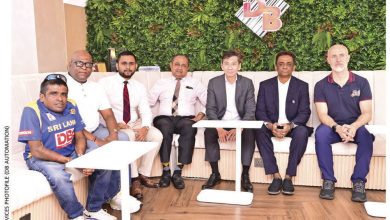IFS SRI LANKA
Q: How has Sri Lanka’s IT industry progressed?
A: Software has become a platform for all that we do. Every- thing from food, travel and health, to entertainment and education, are driven by consumer behaviour and to serve consumers. To serve ever-changing consumer needs and wants, companies must identify the means to reach out, serve quickly and provide the best.
Software and technology platforms have enabled individuals to connect to achieve this.
In Sri Lanka, our adaptability and ingenuity have enabled change to be absorbed and embraced more rapidly and smoothly than in many other countries. The IT industry has grown rapidly in recent years and is more appealing to young graduates than most traditional streams. This is evidenced by the surge in demand for such degrees and a growing startup ecosystem.
The IT and business process management (BPM) industry has become one of the country’s top revenue earners, standing as the fifth highest export revenue earner. As for the future, the industry aims to earn US$ 5 billion in revenue, nurture 1,000 startups and generate 200,000 jobs by 2022.
Given the 26 year war, the IT industry’s progress has been astonishing and we expect phenomenal growth in the years to come.
Q: Could you outline IFS’ contribution to the local economy?
A: Being among the largest tech employers in Sri Lanka and having been in operation here for 23 years, IFS has provided significant inputs to the country’s IT skills and job market. Furthermore, the company’s sales and service operations in South Asia earn export revenue for the nation.
IFS also enjoys close relationships with many local universities and offers scholarships to outstanding students. Over 110 scholarships have been awarded in recent years. Of these students, 105 were absorbed by the company.
As a global leading enterprise solutions provider, IFS is positioned as the only Tier 1 ERP company with an R&D facility in Sri Lanka. As such, the knowledge and expertise it’s introduced to the country over the years has even helped shape policies related to the IT industry.
We also look to give back to society through the IFS Foundation. This year, we selected a village in the Puttalam District to uplift in terms of infrastructure, sanitation facilities, water, education and the livelihood of families. IFS has strived to be a responsible but silent contributor to national development.
Q: What is IFS Sri Lanka’s role in the wider Asia-Pacific, Middle Eastern and African operation?
A: The Sri Lankan operation is a strategic investment of IFS and its largest office outside Sweden with approximately 1,400 employees. Product development, support, global services and other offshore extended functions are performed from the Colombo offices.
Beyond housing IFS’ largest R&D and global operations outside Sweden, IFS Sri Lanka manages the South Asia Customer Organisation, which sells services and supports organisations in the region that use IFS Applications – a leading ERP, enterprise asset management (EAM) and field service management (FSM) product.
Over the years, IFS South Asia has contributed consistent revenues with double digit growth year on year. In the wider Asia-Pacific, Middle Eastern and African region, the South Asian team contributes between eight and nine percent in licensing revenue. In 2019, revenue grew by 24 percent, exceeding projections by 13 percent.
Q: In which industries does IFS operate?
A: IFS is present, and has substantial investments and product offerings, in five main industries globally – viz. aviation and defence, manufacturing, services, telecom energy utilities and resources, and engineering construction and infrastructure.
In a globally competitive landscape, vendors cannot eliminate or neglect the power of customers’ choices. So IFS offers multiple options in terms of enterprise software for businesses, be it cloud or premium subscription based, software as a service (SaaS) and so on. We work with customers to ensure that IFS offers solutions that work for them.
Q: What is a ‘challenger mindset’?
A: Those who dare to challenge norms, try new ideas and techniques win, whether it’s by seizing market share or establishing new markets. Great innovators are most often great disruptors too – people whose ideas may seem farfetched and extraordinary at first can transform markets and even entire economies eventually.
IFS wants to partner with challengers and help them on their journey to success. Much like them, we believe in thinking differently and questioning how things can be done better. By working with our customers, we’ll build the future.
Q: How does this resonate with IFS customers?
A: Globally, most of our clients are challengers who challenge themselves or try to break the status quo of their industries.
This attribute is identified and established when we meet new clients, and assess their requirements and challenges.
Q: And finally, what are IFS South Asia’s plans for the future?
A: We intend to continue to be a challenger in 2020 and challenge our success of last year.








